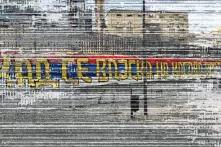When it comes to issues related to war, media outlets in Kosovo tend to focus more on ethnic differences, while similarities or commonalities are often overlooked in the general portrayal, and dissenting voices are almost never included.

Media coverage in Kosovo on March 24 and 25 primarily focused on NATO's decision to launch an air campaign against Serbia on March 24, 1999, in an effort to end the human rights violations being committed against the Albanian population in Kosovo at that time.
Media reporting has been focused on the history of this date, particularly Operation Allied Force which lasted 78 days, after the then President of Yugoslavia, Slobodan Milošević, agreed to withdraw the army, paramilitary and police forces from Kosovo.
In its reporting, the public broadcaster Radio Television of Kosovo (RTK) dedicated the most time to covering the 25th anniversary of the start of the bombings. In addition to RTK, other media outlets have also prominently featured the narrative that the air campaign followed “the failure to sign the Rambouillet agreement by the Yugoslav delegation” and that “the humanitarian intervention of NATO ended the genocide in Kosovo”.
RTK also dedicated space to the war, broadcasting live the ceremony marking the anniversary of the Dukagjini Battle in 1999, which took place in Gllogjan in Deçan. During the speeches that were broadcast live on RTK, the speakers, including former Prime Minister Ramush Haradinaj, and the Prime Minister of North Macedonia, Talat Xhaferi, focused more on the glory of the KLA war and less on the anniversary of the bombings.
On RTK and in all media, the President of Kosovo, Vjosa Osmani, received significant coverage. Along with 9 ambassadors, including those from the USA, France, Great Britain, and Croatia, she paid tribute at the memorial of NATO soldiers who lost their lives while serving in Kosovo. The President expressed her eternal gratitude to NATO" and stated that "March 24 is the day when the democratic world united to stop the extermination of the Albanian people by the genocidal regime of Milošević".
During a special program on March 24th, guests on RTK, including two university professors (Bujar Dugolli and Nuri Bexheti) discussed the NATO intervention, the violent acts committed by the Serbian forces, the role of the KLA, and American involvement in the liberation of Kosovo.
On the prime-time news edition of RTK and 8 other television channels - KTV, RTV21, Klan Kosova, ATV, Dukagjini, T7, Kanal 10 and TEVE - chronicles were broadcast to commemorate the NATO intervention in Kosovo. Additionally, the President, Prime Minister, Speaker of Parliament, and other party leaders shared their commemorations on social networks.
Unlike other Albanian language media, KTV also included Facebook statements from the Serbian President, Aleksandar Vučić, who refers to NATO's intervention as "aggression, destruction and killing of children", as well as the Serbian Ambassador to Washington, Marko Đurić, who also labels it as "aggression".
KTV also published a reaction from Serbian human rights activist Nataša Kandić, who stated: "With the accusations of aggression, the authorities in Serbia are trying to conceal the crimes committed by the police and Serbian army in Kosovo, where 7,000 civilians were killed in just 78 days".
Almost all media outlets broadcast information with the same content. The word genocide was mainly mentioned in reports on public television and Klan Kosova TV, especially in news segments about the NATO bombings. In addition to the President's tributes at the memorial, the upgrade of the Kosovo Assembly’s status within the NATO Parliamentary Assembly from observer to associate member has also taken center stage.
In the television news and print media, there were mostly statements from former US President Bill Clinton, General Wesley Clark, and political leaders in Kosovo. However, there was no information about some of the attacks that resulted in civilian casualties.
In addition to the past statements made by former US President Bill Clinton and other leaders, new interviews have also been broadcast. RTK aired an interview with American pilot Faruzia Kallaba, who served in the bombing campaign, and an interview with former NATO spokesperson, Jamie Shea, discussing the necessity of "humanitarian intervention". They also shared a chronicle about citizens’ memories during the bombing. RTV 21 broadcast an interview with the former NATO commander for Europe, Wesley Clark, while Klan Kosova showed a brief sequence of an interview with an American colonel, Jeffrey Fischer.
Print media outlets like Kallxo, Koha, Telegrafi, Gazeta Express, RTKlive, Indeksonline, and others, have published content that is more or less similar to that broadcast on television. They have emphasized the historical aspect and quoted statements from the President, the Prime Minister, the Speaker of the Parliament, as well as the leaders of the opposition.
Unlike Albanian language media, Serbian media outlets in Kosovo such as TV Most and TV Puls have dedicated more coverage to statements from officials in Serbia. They also included a statement from the President of Kosovo, who expressed hope that Kosovo would soon join NATO.
Context Analysis
The Albanian-language media, in general, explain the context of the bombings by noting that Kosovo was an autonomous region in the former Yugoslavia that struggled to be an equal part of the Yugoslav federation.
To consolidate his political power and bring Kosovo under direct control, Serbia's nationalist leader, Slobodan Milošević stripped Kosovo of its autonomy in 1989. Kosovo Albanians strongly opposed the revocation of autonomy and continued their peaceful resistance, which eventually escalated to armed resistance for freedom and independence.
Altogether, the primary focus of news coverage on Albanian-language television in Kosovo centered on highlighting the imperative of preventing genocide and ethnic cleansing, as well as showcasing other NATO's notable achievements; facilitating the withdrawal of Yugoslav forces from Kosovo subsequent to the former Yugoslavia's capitulation, leading to Kosovo being placed under international protectorate following the adoption of UN Resolution 1244. Furthermore, NATO established military presence, enabling the return of displaced individuals, and collaboration with the UN, the EU, and the OSCE on establishing a temporary administration in the nation.
However, they have not addressed issues related to operational problems, planning errors, or unintended civilian victims from Albanian, Serbian and Roma communities.
Analyzing and comparing media reports, particularly in relation to their coverage of the 25th anniversary of the NATO airstrikes in Kosovo, reveals that the media in Kosovo adopted two different frames when reporting on the large-scale NATO military intervention, creating divisions along ethnic lines.
While the Albanian-language media in Kosovo portrayed the intervention as a necessary action to stop "ethnic cleansing and genocide", the Serbian-language media predominantly disseminated news and analysis that supported the narrative of it being an "aggression" against the sovereignty and territorial integrity of Yugoslavia.
The general media reflections on the airstrikes indicate a strong influence of national interest in the reporting frames.
In pursuit of national interest, the media in Kosovo show a clear tendency towards creating cohesive narratives when reporting on the anniversary of the NATO intervention.
NATO's military intervention was identified as the thematic context, although an important part of the content is also devoted to the construction of Kosovo's sovereignty.
Although most of the texts were neutral and written in a more moderate language, the sources and interviewers had an approach that included elements that perpetuated the image of Kosovo as a victim of Serbia.
Leaving aside many of the issues surrounding the timing of the bombings, particularly the number of civilian casualties which remains largely unknown in Kosovo, and how it actually happened, the reporting on the events is heavily influenced by sources that align with national interests and is illustrated by the use of stereotypes.
In Kosovo's media in general, there is a lack of authentic information about what happened during the bombings. This is largely due to the fact that most of the information is based on international media reports.
At that time, the Serbian government was conducting a systematic campaign of ethnic cleansing in Kosovo, carried out by military and paramilitary troops, and there was limited opportunity for the few local media outlets to access authentic and professional information from the ground.
When it comes to issues related to the war, media outlets in Kosovo tend to focus more on ethnic differences, while similarities or commonalities are often overlooked in the general portrayal, and dissenting voices are almost never included.
Despite the fact that the informative texts, TV news, and Albanian language media around March 24th were more neutral and fact-based, the choice of sources in most cases had the potential to polarize the reporting. Most media coverage of March 24th indicated that emotion and polarization were central to the majority of texts.
In some cases, the language used in reports from outlets like RTK and Klan Kosova is characterized by a high level of polarization between the two entities, Serbian and Albanian one, which increases the emotional intensity of the narrative within the analyzed content.
In most of the reports, there was not much emotional content, although the language used by some interviewees, particularly those who spoke about their experiences during that time, whether they were civilians or former guerrillas, was more emotionally charged.
After analyzing the reports for this anniversary of the NATO intervention and comparing them with previous reports, it is evident that there has been little change in the reporting approach.
Stereotypes that have dominated the general discourse for more than two decades are still entrenched in the reporting framework, many of which are related to Serbia and Serbs as perpetrators of ethnic cleansing.
However, NATO's 1999 bombing campaign in Kosovo remains a controversial topic between the Albanian and Serbian media in Kosovo.
The Albanian language media outlets provide a platform for key Albanian figures who participated in the Rambouillet conference and the war, while Serbian media outlets give more space to former Serbian officials who held high political or military positions during Slobodan Milošević’s reign to speak out against NATO.
While most Albanian language media reports describe the NATO intervention as a humanitarian effort to prevent genocide and ethnic cleansing, Serbian media continues to push anti-NATO narratives regarding the intervention in the Kosovo war.
In the overall context, despite the division along ethnic lines and the one-sided narrative, media in the Albanian and Serbian languages in Kosovo remain under the influence of political groups and reflect the general political and social reality in the country regarding the perception of the NATO intervention.


